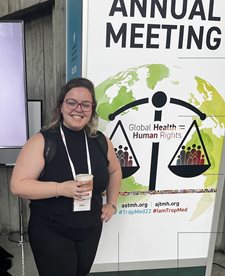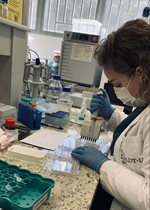
Leticia Tiburcio Ferreira is a Brazilian researcher from Pouso Alegre. She attended her first ASTMH Annual Meeting in 2022 with the financial assistance of a
Travel Award. The Society offers a large number of Travel Awards every year to qualified students, early career investigators and scientists actively working in the tropical medicine field to attend the Annual Meeting. In 2022, Travel Awards were granted to 59 qualified individuals from around the world.
Ms. Tiburcio Ferreira is working toward a PhD in Genetics and Molecular Biology at University of Campinas, under the supervision of Fabio Costa, PhD. This past year, she has been living in New York City for an internship with ASTMH member and past Board member David Fidock, PhD, FASTMH, at Columbia University Irving Medical Center, where she has focused her research on deconvolution of drug targets and cross-resistance.
How did you learn about the ASTMH Travel Award?
Dr. Fidock, who is a long time ASTMH attendee, brought the Travel Award to my attention. The possibility of attending such a renowned conference without having to worry about financial resources – which can be sometimes limiting for scientists from developing countries - was what prompted me to apply.
 Was this your first ASTMH Annual Meeting?
Was this your first ASTMH Annual Meeting?
The 2022 conference was my first ASTMH Annual Meeting, and I was happy to attend it because I know that such high-quality science is presented. Especially because the Travel Award is such a great opportunity, many fellow students and young-career researchers have the chance to present their data and share their insights. I felt happy to acknowledge that underrepresented niches of tropical medicine were so well-represented at this meeting.
What were the highlights for you at the Seattle meeting?
One of the highlights was the courtesy visit to the Bill & Melinda Gates Foundation offered to Travel Awardees. (The Gates Foundation is a longtime supporter of the Travel Awards.) I felt like that experience allowed me to connect to the principles that drive the Foundation’s work. Another highlight was the diversity of topics that the conference embraced and represented. I, for sure, was very eager to attend specific sessions that directly related to my area of expertise and interest – ones that covered the epidemiology of antimalarial drug resistance and novel drug developments, for instance. However, I was also able to expand my trajectory within the conference and explore other topics in other fields of study. I think this curiosity in general is also part of being a scientist.
Do you recommend that other students and early-career scientists apply for a Travel Award?
I definitely encourage other students or young researchers to apply for a Travel Award because it can represent an invaluable opportunity to get in touch with the science that is being done around the world, especially science in the early stages that is not yet published. Conferences are the place to give and receive feedback and discuss your work with your peers. On a curious note, I was able to meet and with two other young Brazilian scientists who had similar backgrounds as me, who also knew the same mentors, but had never had the chance to connect. Overall, attending the meeting was a fantastic experience.